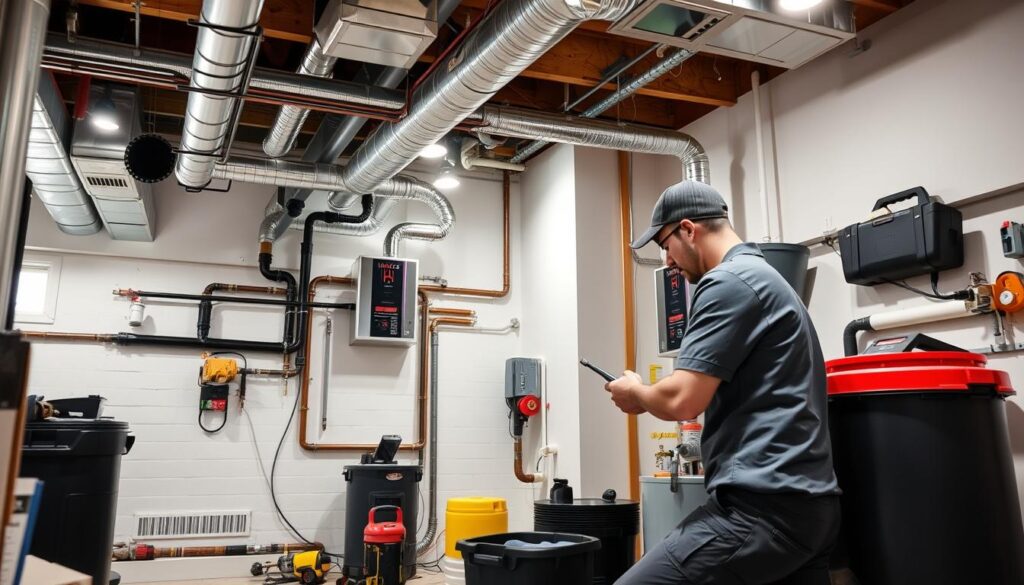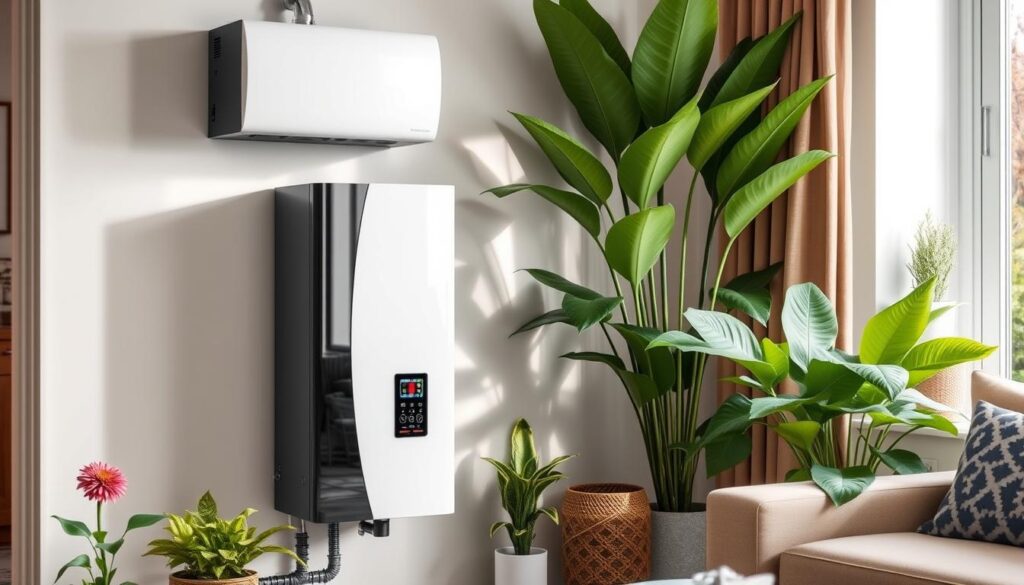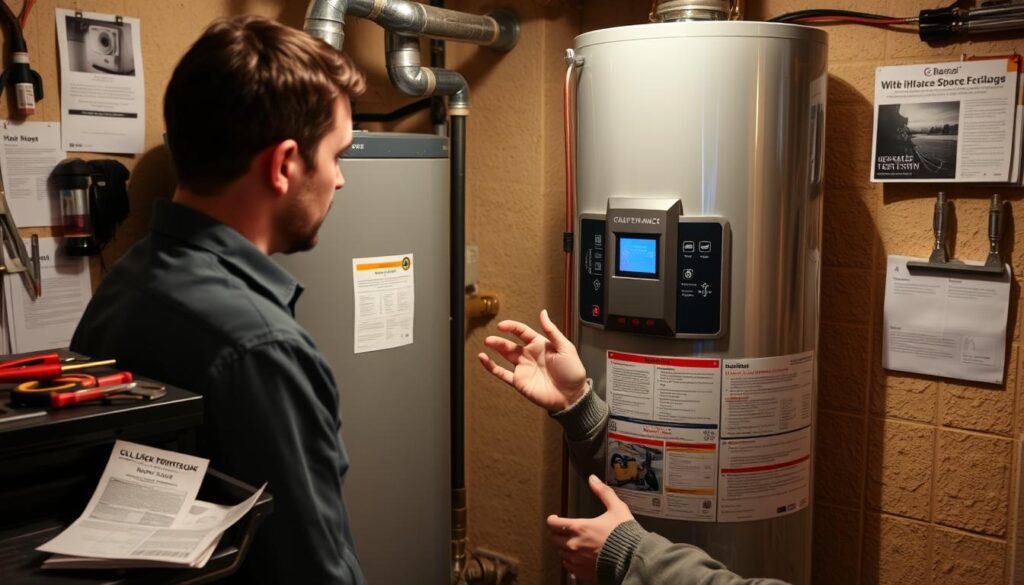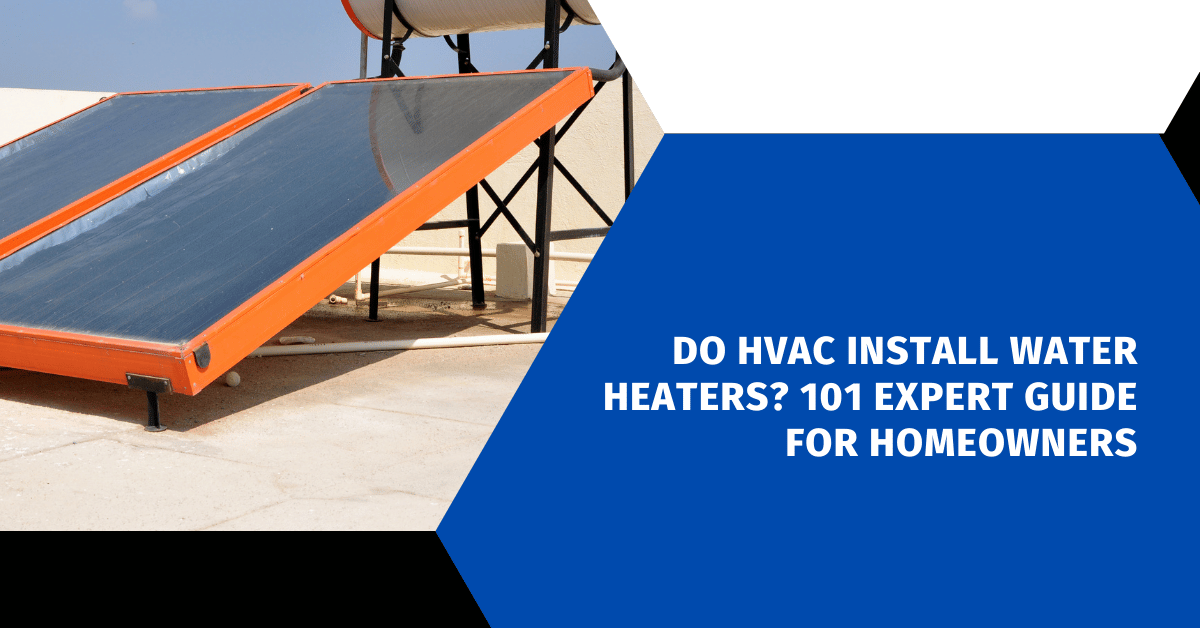Affiliate Disclosure
HVAC Guide Guys is a participant in the Amazon Services LLC Associates Program, an affiliate advertising program designed to provide a means for sites to earn advertising fees by advertising and linking to Amazon.
Do HVAC Install Water Heaters? As a homeowner, you want your home’s systems to work well and safely. You might wonder, “Do HVAC contractors install water heaters?” Yes, they do. HVAC pros are key in installing and keeping your water heater running smoothly. They help make your home comfortable and energy-efficient.

In this guide, we’ll look at HVAC contractors’ role in water heater installation. We’ll cover the different types of water heaters and why professional installation is important. We’ll also talk about costs and how to save energy, helping you choose the best for your home.
Key Takeaways
- HVAC contractors often provide water heater installation and maintenance services as part of their comprehensive home services.
- Understanding the different types of water heaters, including traditional and heat pump models, can help you make the best choice for your home’s needs.
- Professional installation is crucial for ensuring safety, code compliance, and optimal performance of your water heater.
- Exploring available tax credits, rebates, and long-term energy savings can help offset the initial cost of a new water heater installation.
- Proper sizing, ventilation, and location considerations are important factors for a successful water heater replacement or installation.
Table of Contents
Understanding the Role of HVAC Contractors in Water Heater Installation
HVAC contractors are key in water heater installations. They handle various types, like tankless water heaters and heat pump water heaters. Their skills go beyond heating and cooling, making them great for safe and efficient installations.
Common Types of Water Heater Installations
HVAC pros can install many water heater models. They work with gas water heaters and electric water heaters. They know how to follow local codes and ensure everything is set up right.
Licensing and Certification Requirements
In some places, HVAC contractors need special licenses for water heater installs. They might need a plumber’s license for safety checks. The rules vary, depending on the contractor’s qualifications.
Service Coverage Areas
Where HVAC contractors can work also matters. Some do water heater services along with HVAC. Others focus only on HVAC. Homeowners should check with local providers to see what they offer.
Working with skilled HVAC contractors is a smart move. They ensure the right water heater is chosen and installed correctly. This meets your home’s needs and energy goals.
Explore Our HVAC Shop
Looking for top-rated HVAC tools, parts, and accessories? Visit our shop and find the perfect solution for your needs.
Visit the ShopDo HVAC Install Water Heaters: What You Need to Know
HVAC (Heating, Ventilation, and Air Conditioning) pros are key for water heater setup or swap. They know how to work with both old and new water heater systems. This includes energy-saving heat pump models.
HVAC experts are skilled in handling different water heater power sources. This includes gas, electric, and solar. They can help pick the best water heater for your home. They consider your household size, energy use, and local rules.
- HVAC pros use NATE-certified techs for top-notch water heater installs.
- They also offer repair and upkeep for water heaters. This uses their plumbing and electrical know-how.
- Regular upkeep, like leak checks and duct cleaning, is part of their service.
When picking an HVAC contractor for your water heater needs, ask about their skills and licenses. Some HVAC firms focus on water heaters and offer a full service package. Others might not. By asking the right questions, you can find a qualified HVAC pro for your needs.
| Type of Water Heater | Typical Installation by HVAC Professionals |
|---|---|
| Conventional Tank Water Heater | HVAC pros are good at installing these due to their plumbing and electrical skills. |
| Tankless (On-Demand) Water Heater | HVAC experts can set up these energy-saving models. They need the right venting and electrical hookups. |
| Heat Pump Water Heater | HVAC contractors know how to add these eco-friendly water heaters to homes. They ensure the best performance and energy savings. |
Choosing a skilled HVAC pro for your water heater needs means a smooth install, upkeep, and reliable support. This keeps your home comfortable and efficient.
Benefits of Professional Water Heater Installation
Having a professional install your water heater is key. They ensure safety, follow codes, and integrate systems well. Experts in HVAC and plumbing know how water heaters work with your home, offering skills DIYers might not have.
Safety and Code Compliance
Professionals get the right permits and know local codes well. They avoid mistakes that could be dangerous, like carbon monoxide leaks. This way, your water heater works safely and efficiently for your family.
Expertise in System Integration
HVAC and plumbing pros pick the best water heater size and type for your home. They check if a tankless water heater is better for you. Their knowledge ensures your water heater works well with your home’s systems.
Warranty Protection and Support
Choosing a pro for your water heater installation means you get warranty and maintenance help. Reputable companies offer long warranties, giving you peace of mind. They also offer tips to keep your water heater running smoothly and saving money.
Investing in home maintenance, energy efficiency, and professional installation for your water heater brings many benefits. Working with HVAC and plumbing experts means a safer, more efficient, and better water heating system for your home.
Traditional vs Heat Pump Water Heaters: Making the Right Choice
Homeowners now face a choice between traditional electric or gas water heaters and heat pump water heaters (HPWHs). It’s important to know the differences to pick the best for your home and energy goals.
Heat pump water heaters are known for their high energy efficiency. They are 2-3 times more efficient than standard models. This means big savings on energy costs, with a family of four saving almost $550 a year.
The cost of installing a HPWH is higher, from $1,500 to $3,000. But, there are incentives and rebates to help with the cost. Homeowners can get a 30% federal tax credit (up to $2,000) on the cost, including installation.
When deciding, think about energy savings, space, and long-term costs. Tankless water heaters are also energy-efficient and can last up to 20 years with care.
The right choice depends on your needs, budget, and desire for energy efficiency and environmental impact. By considering the pros and cons, you can choose what’s best for your home and family.

“If all electric water heaters sold in the United States were ENERGY STAR certified, it is estimated that savings of more than $8.8 billion each year could be achieved, and nearly 170 billion pounds of greenhouse gas emissions would be prevented (equivalent to emissions from over 16 million vehicles).”
Explore Our HVAC Shop
Looking for top-rated HVAC tools, parts, and accessories? Visit our shop and find the perfect solution for your needs.
Visit the ShopCost Considerations for Professional Water Heater Installation
The cost of installing a new water heater varies a lot. It depends on the type, size, and how complex the installation is. Basic models start at $130.99, while top-of-the-line systems can cost up to $5,500. Tankless water heaters are between $1,200 and $3,500, and traditional tank models are $820 to $1,290 on average.
Labor and Materials Breakdown
Installing a water heater usually costs between $900 and $3,000, with $1,400 being common. Plumbers charge $75 to $150 an hour. The total time needed can be from two to ten hours, depending on the job’s complexity.
Available Tax Credits and Rebates
Homeowners can get tax credits and rebates to help with the cost. For example, federal tax credits can cover up to 30% of the cost of heat pump water heaters, up to $2,000. Utilities also offer rebates of $300 to $1,000 for energy-efficient water heaters.
Long-term Savings Analysis
It’s important to think about the long-term savings when choosing a water heater. Efficient models like tankless or hybrid heat pump water heaters save a lot on energy bills. Tankless water heaters are 8% to 34% more efficient than traditional tanks, leading to big savings.
“Investing in a high-efficiency water heater can pay off in the long run through reduced energy costs and increased home value.”
Essential Factors for Water Heater Replacement
When it’s time to replace your water heater, several key factors come into play. The age and condition of your current unit are crucial. Traditional storage water heaters usually last 10-12 years, while heat pump models can go up to 15 years. Replacing it early can help avoid sudden failures and let you pick a more energy-saving model.
Consider switching to a heat pump water heater for better energy savings. These systems are great for those who want to save on energy and maintain their homes well. But, if you’re moving from a gas to an electric heat pump, you’ll need to check your electrical service, seal any vents, and make sure the new unit fits your hot water needs.
| Water Heater Type | Typical Lifespan | Energy Efficiency |
|---|---|---|
| Traditional Storage | 10-12 years | Moderate |
| Heat Pump | 13-15 years | High |
Understanding the important factors in water heater replacement helps you make a smart choice. It’s about finding the right balance for your home, energy goals, and budget. Working with a skilled HVAC expert ensures a smooth and effective water heater replacement process.
“Replacing your water heater proactively can prevent emergencies and allow you to select the most energy-efficient model for your home.”
Explore Our HVAC Shop
Looking for top-rated HVAC tools, parts, and accessories? Visit our shop and find the perfect solution for your needs.
Visit the ShopInstallation Requirements and Space Considerations
When it comes to water heater installation, planning and detail are key. They ensure your water heater works well, is safe, and saves energy. Whether you choose a traditional tank or a heat pump water heater, knowing what you need is important.
Ventilation and Air Space Needs
Heat pump water heaters need lots of air space to work right. They need at least 450 cubic feet of air. Also, good ventilation is key to handle any moisture and keep air moving.
Electrical and Plumbing Requirements
Think about the electrical and plumbing needs too. Heat pump water heaters need a 240-volt power source. Sometimes, you might need to upgrade your home’s electrical system. Plumbing-wise, make sure there’s a way for the water heater’s condensate to drain.
Location and Accessibility Factors
Where you put the water heater matters a lot. Consider noise levels, which can be 45 to 60 decibels for heat pumps. Also, think about how easy it will be to get to for upkeep. For home maintenance and energy efficiency, the water heater should be in a good spot.
Getting your water heater installed right takes a lot of knowledge. Work with a skilled installer to make sure it’s done well. This way, you’ll get the best performance and save energy in the long run.
Energy Efficiency and Environmental Impact
Water heaters need to be energy efficient and good for the environment. Heat pump water heaters are the best choice, using up to three times less energy than electric ones. This means big savings on your bills and less harm to the planet.
Heat pump water heaters are great for the environment too. They work well with solar panels, making them even greener. The ENERGY STAR label means they meet high standards for energy use, saving you money over time.
Think about the planet when picking a water heater. Efficient ones save resources and cut down on pollution. With rebates and tax breaks, getting a high-efficiency water heater is smart for your wallet and the Earth.
| Energy Efficiency Comparison | Environmental Impact |
|---|---|
|
|
“Investing in an energy-efficient water heater is not only a smart financial decision but also a meaningful step towards a more sustainable future.”
Choosing a heat pump water heater means better energy use and less harm to the environment. Plus, you’ll save money on your energy bills. This smart choice for your home helps your wallet and the planet.
Explore Our HVAC Shop
Looking for top-rated HVAC tools, parts, and accessories? Visit our shop and find the perfect solution for your needs.
Visit the ShopMaintenance Tips and Best Practices
Keeping your water heater in good shape is key for its long life and energy savings. Regular care helps your unit work better, saving you money and avoiding big repair costs later.
First, flush the tank every six months to clear out sediment. This keeps your heater running smoothly. Also, check the anode rod, which fights off corrosion. If it’s worn, replace it to keep your heater working right.
For heat pump water heaters, clean the air filters often to ensure good airflow. Set the water temperature to 120°F (49°C) for best efficiency and safety. Higher temperatures use more energy and can be dangerous.
Getting a yearly check-up from a pro is a smart move. They can spot small problems before they get big, saving you money and keeping your heater in top shape.
By sticking to these easy maintenance tips, you’ll make your water heater last longer, save energy, and have hot water when you need it. A little effort now means big savings later.
| Maintenance Task | Frequency | Estimated Cost | Potential Benefits |
|---|---|---|---|
| Flushing the tank | Every 6 months | $0 (DIY) | Removes sediment, improves efficiency |
| Checking/replacing anode rod | Annually | $22 – $50 | Protects tank from corrosion |
| Cleaning air filters (heat pump) | Every 3-6 months | $0 (DIY) | Maintains proper airflow, enhances efficiency |
| Professional inspection | Annually | $100 – $200 | Identifies issues early, prevents costly repairs |
By following these tips, your water heater will work better, saving you money and lasting longer. Regular care is a small price to pay for big savings over time.

Conclusion
HVAC experts are great at water heater installation. They know both old and new systems well. Getting HVAC services from pros means safety, efficiency, and following local rules.
Think about the benefits of heat pump water heaters. They use less energy and can save you money over time. Consider the space needed, installation costs, and upkeep when choosing.
Getting a good water heater can save you money and make your home more comfortable. Work with skilled HVAC contractors. They’ll help pick the right size and ensure it works well with your home.
Need a new water heater or an upgrade? HVAC pros can help you meet your hot water and energy-saving goals. Research well, think about the long-term, and pick what’s best for your home.
FAQ
Do HVAC contractors install water heaters?
What types of water heaters can HVAC contractors install?
What are the benefits of professional water heater installation?
How do traditional and heat pump water heaters compare in terms of energy efficiency?
What are the cost considerations for professional water heater installation?
Do HVAC contractors install water heaters?
What types of water heaters can HVAC contractors install?
What are the benefits of professional water heater installation?
How do traditional and heat pump water heaters compare in terms of energy efficiency?
What are the cost considerations for professional water heater installation?
FAQ
Do HVAC contractors install water heaters?
Yes, HVAC contractors install water heaters. They have the right licenses and know the local codes. This ensures your water heater is installed correctly.
What types of water heaters can HVAC contractors install?
HVAC pros can install many types of water heaters. This includes traditional, tankless, and heat pump models. They can help you choose the best one for your home.
What are the benefits of professional water heater installation?
Professional installation is safe and follows local codes. It also ensures your system works well together. Plus, HVAC experts can help with maintenance and advice for your water heater.
How do traditional and heat pump water heaters compare in terms of energy efficiency?
Heat pump water heaters are much more energy-efficient. They use 3-4 times less energy than traditional models. This means big savings on energy costs and less harm to the environment.
What are the cost considerations for professional water heater installation?
The cost of installation depends on the type, size, and complexity of the unit. Heat pump water heaters cost between
FAQ
Do HVAC contractors install water heaters?
Yes, HVAC contractors install water heaters. They have the right licenses and know the local codes. This ensures your water heater is installed correctly.
What types of water heaters can HVAC contractors install?
HVAC pros can install many types of water heaters. This includes traditional, tankless, and heat pump models. They can help you choose the best one for your home.
What are the benefits of professional water heater installation?
Professional installation is safe and follows local codes. It also ensures your system works well together. Plus, HVAC experts can help with maintenance and advice for your water heater.
How do traditional and heat pump water heaters compare in terms of energy efficiency?
Heat pump water heaters are much more energy-efficient. They use 3-4 times less energy than traditional models. This means big savings on energy costs and less harm to the environment.
What are the cost considerations for professional water heater installation?
The cost of installation depends on the type, size, and complexity of the unit. Heat pump water heaters cost between $1,500 and $3,000, excluding installation. But, there are incentives and rebates that can help lower the cost.
What factors should be considered when replacing a water heater?
When replacing your water heater, think about its age and condition. Replacing it early can prevent emergencies. It also lets you choose a more efficient model, like a heat pump water heater.
What are the installation requirements and space considerations for heat pump water heaters?
Heat pump water heaters need at least 450 cubic feet of air space. You also need to consider ventilation, electrical, and location factors. This ensures they work well and efficiently.
How important is maintenance for water heaters?
Regular maintenance is key for your water heater’s life and efficiency. This includes flushing, checking the anode rod, and looking for leaks or corrosion. Proper care can make your water heater last longer and stay efficient.
,500 and ,000, excluding installation. But, there are incentives and rebates that can help lower the cost.
What factors should be considered when replacing a water heater?
When replacing your water heater, think about its age and condition. Replacing it early can prevent emergencies. It also lets you choose a more efficient model, like a heat pump water heater.
What are the installation requirements and space considerations for heat pump water heaters?
Heat pump water heaters need at least 450 cubic feet of air space. You also need to consider ventilation, electrical, and location factors. This ensures they work well and efficiently.
How important is maintenance for water heaters?
Regular maintenance is key for your water heater’s life and efficiency. This includes flushing, checking the anode rod, and looking for leaks or corrosion. Proper care can make your water heater last longer and stay efficient.

